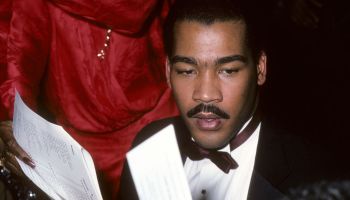We’ve all seen the headlines declaring the extinction of Black love, and the supposed war between Black men and women. From “Nightline” to The New York Times, the media has been obsessed with single Black women and their marriage prospects, all the while hinting at a colossal rift between Black men and Black women. At some point, you’ve probably even been in a heated conversation about the complicated and inextricable relationship between the two, when one of your girls uttered the words that many of us have been thinking for a long, long time.
“Black men ain’t shit!”
You laughed, but secretly amen-ed her for giving voice to the frustration, anger, and hurt you’ve felt over the years.
If you’ve listened to the media or even some of your friends, you might believe the hype that Black love is dead and that Black men no longer have love and respect for Black women. Perhaps it has even played out in your own relationships. Your ex was trifling and left you wounded and your heart scarred. Or was it your dad who abandoned you, leaving you leery of trusting men, especially Black ones?
Recently, a short piece I wrote giving props to some Black men spiraled into a collective diatribe about everything we hate about them. My article, “Dear Brothas: We Still Love You,” had an admirable aim—highlight five men doing their thing, and ask you, the reader, to list other men you were checking for. I also intended to break from the deluge of yet another “Four Colored Girls” article. But somewhere along the line, some readers took the piece as a slap in the face, and questioned why we should give Black men props at all.
I must admit I wasn’t prepared for the feelings that manifested in the comments section. Some felt my piece was an apology for “telling our own truth,” while others used the space to air their frustration. One sister went off.
“I am tired of [black men’s] bullsh*t! when you stop knocking other people out of the way so you could be the first ones to say b*tch/hoe/gold digger in reference to a black woman, when you stop leading other races to believe that black women are the reason why the black race is in the state it is today…then MAYBE, just MAYBE, i just might “recognize” how you “rock”, because right now, i’m not being given a whole lot of examples of why you supposedly do, just a bunch of bitchin’, moanin’, whinin’ and cryin’ excuses.”
While I understand the anger and hurt some of us have toward Black men, I walked away wondering when we lost the ability to give those who deserve it props in spite of those who don’t.
When did celebrating GOOD Black men become unacceptable?
I’ve never subscribed to the idea of “The Angry Black Woman.” I know far too many Black women who are not bitter or angry. Too many who do not fit the stereotype of the neck-swiveling sister, ready to cut anyone (especially a Black man) down to size with her words. But I could not understand the collective anger hurled at all Black men in the comments section, as if good ones are as mythical as unicorns.
Generalizations don’t do anyone justice. Just as I don’t subscribe to the idea of “The Angry Black Woman,” I refuse to believe Black men, as a collective, ain’t shit.
Do brothas have a lot of work to do? Hell yeah. Black men need to stand up and turn a critical eye on why some of them so freely label Black women as bitches, hoes, and gold diggers, as the sister alluded to in her comments. However, Black women need to hold themselves accountable as well.
Put the knives away ladies and rock with me for a minute.
Music and pop culture greatly affect how we relate to one another. Whether we listen to and support certain artists or not, we cannot live in this world and not be affected by how people who look like us are portrayed in the media.
Hip-hop is big business. It’s grown from being a hyper-local art form, to a billion-dollar global business in the last 30 years. Because of this, the images celebrated and promoted by hip-hop—the hyper-masculine, violent Black man and the sexually promiscuous Black woman—have affected how we relate to one another. While these images (the Black brute and the jezebel) certainly aren’t new, through hip-hop they are being propagated by their own. No longer are others saying these things about us, we’re saying them about ourselves—and the consequences are real. Little boys grow up thinking “money over bitches” is how all Black men think, while young girls think “he sleeps around, but he gives me a lot” is how relationships should work.
This environment, where both Black women and Black men are fed these gross mischaracterizations of themselves, is where we’ve gone awry. Women may complain all day about Black men not respecting them, but how are we also complicit in this relationship dynamic? How can we hold Black men accountable for the blatant disrespect hurled toward Black women if we consume the same music, watch the same films and TV shows that continue to promote the dysfunction?
In the book, Hip Hop Wars, professor Tricia Ros argues that we should be engaging in “transformational love,” rather than blatant unconditional love, in order to insure the health and growth of our communities. To Rose, in order to affect any sort of change, you have to be able to engage in a type of love that “pushes us past our comfort zone, that demands we wrestle with standards and challenges growth in the interests of [our] well-being.”
We can’t call Black men out without calling ourselves out as well. And if we want the relationship dynamics to change, we must drop the blame game and start having frank discussions that allow both sides to air their pain and frustrations. It will not be easy, but, like it or not, Black men and Black women have an inextricable history that cannot and should not be cast easily cast aside.












